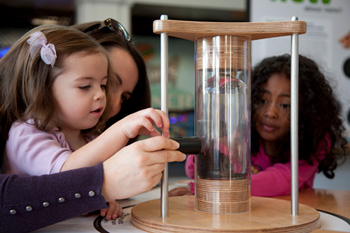News Releases | August 25, 2021
Share ThisAdditional $2.9 Million in IMLS CARES Act Grants Awarded to Museums and Libraries
Funds to Support Pandemic Response Work in Communities Across the Nation
Washington, DC—The Institute of Museum and Library Services today announced $2,921,766 in additional IMLS CARES Act Grants to support the role of museums and libraries in responding to the coronavirus pandemic. The funded projects were selected from highly-rated applications to the previous IMLS CARES Act Grants for Museums and Libraries program.

“We at IMLS are pleased to be able to make the final round of grants from the CARES Act money entrusted to us by Congress and the White House,” said IMLS Director Crosby Kemper. “These funds will continue the great support museums and libraries have given their challenged communities, crossing the digital divide, preserving jobs, helping those most in need, and planning for, and in many cases, reopening.”
The grants will support 21 museum and library services projects that will take place over the next two years, supporting communities across the nation. Examples include:
-
Conner Prairie will develop a digital learning initiative for preschool and K-8 teachers as an alternative to onsite field trips during the COVID-19 pandemic and beyond. The “Conner Prairie in the Classroom” project will provide an array of digital programming, complemented by “HiSTEAMic” hands-on classroom kits to support digital learning and digital backpacks that include iPads, hotspots, and keyboards for classrooms lacking devices for students.
-
The Dyer Library and Saco Museum project, Closing the Digital Divide: Moving the Dyer Library Association into the Twenty-First Century, will help the library and museum improve their ability to provide digital access to their collections and improve virtual public programming. Additionally, the DLSM will be able to continue to remain a valued partner with the local school district by providing digital educational options for classrooms and support for the elementary curriculum during the COVID-19 recovery and beyond.
-
The Pueblo Zoo will expand and improve its capacity to deliver virtual programming for students and families in Colorado communities. The zoo will hire a Virtual Programming Coordinator, enable Wi-Fi throughout the grounds, and implement new online programming for K-12 students and their families, as well as lifelong learners. The zoo will also expand its library of Discovery Kits of biofacts and activities to enhance program content with tactile experiences, and train volunteer docents to present programs independently to expand audience reach.
-
The Fairbanks North Star Borough Public Libraries will make available 25 laptops and MiFi devices (hotspots) for residents to borrow. These internet accessible laptops will include instructional videos, software to assist with resume creation, virtual education, links to local, state, and federal resources for assistance, and literacy software to those patrons who need additional access to resources from home. The extra devices will not only provide services to undeserved library patrons but will also help alleviate demand on library computers.
Previous IMLS CARES Act Grants for Native American/Native Hawaiian Museum and Library Services were announced in August 2020 and CARES Act Grants for Museums and Libraries were announced in September 2020.
For more information about IMLS CARES Act funds distributed directly to State Library Administrative Agencies that may still be available, please visit each SLAA’s page. For a listing of other open IMLS grant opportunities, please visit the IMLS website. For more updates, subscribe to email notifications or visit imls.gov.
About the Institute of Museum and Library Services
The Institute of Museum and Library Services is the primary source of federal support for the nation's libraries and museums. We advance, support, and empower America’s museums, libraries, and related organizations through grantmaking, research, and policy development. Our vision is a nation where museums and libraries work together to transform the lives of individuals and communities. To learn more, visit www.imls.gov and follow us on Facebook and Twitter.
